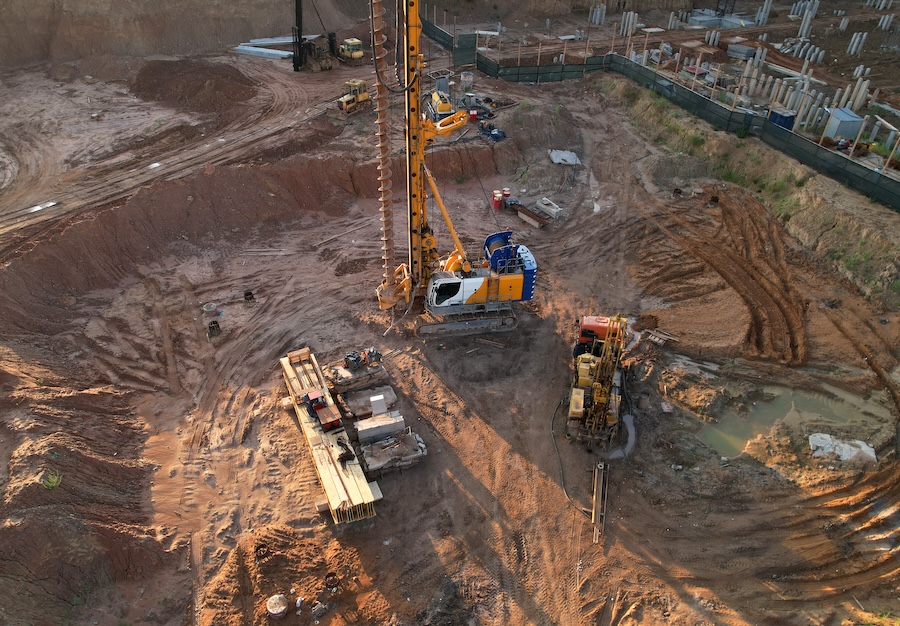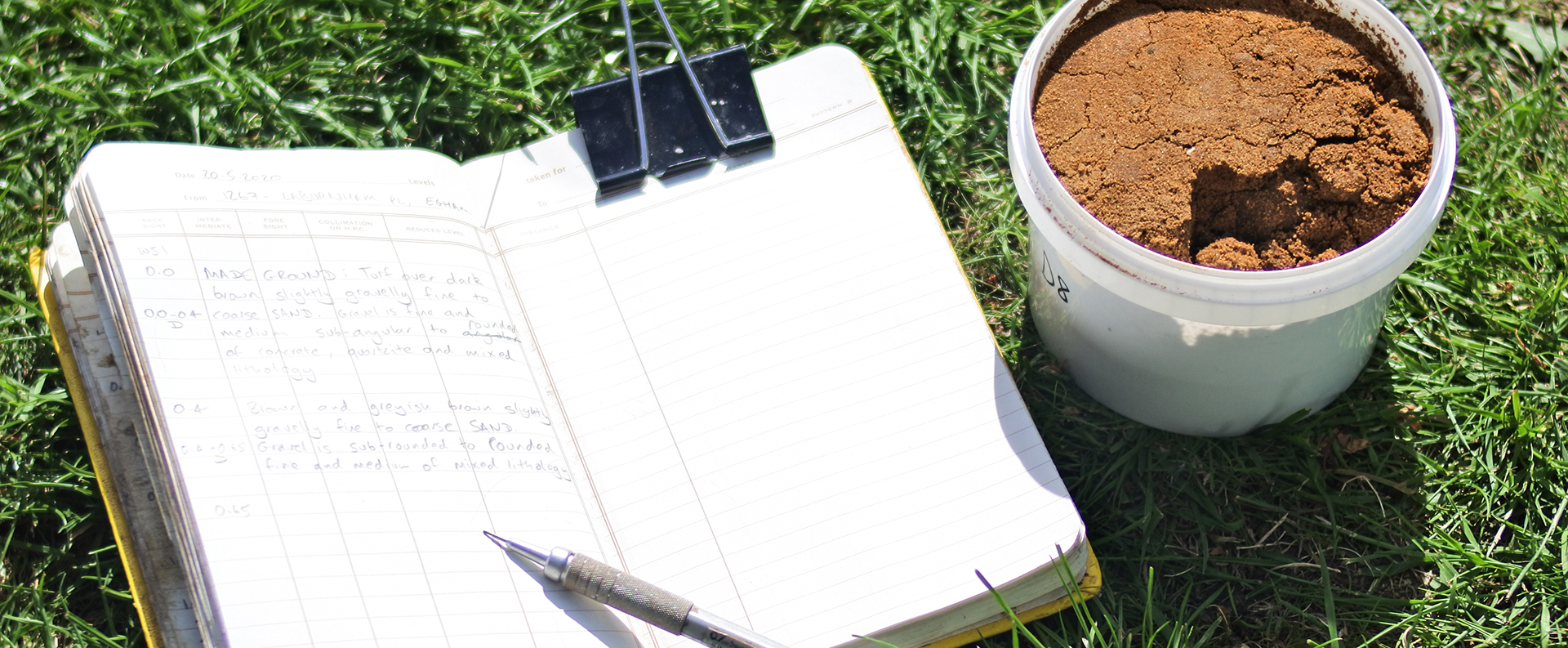Exploring the Duty of a Geotechnical Engineer Description and Duties
Wiki Article
The Significance of Geotechnical Design in Dealing With Ecological Obstacles and Enhancing Construction Safety And Security
Geotechnical engineering acts as a cornerstone in the intersection of ecological stewardship and building and construction safety and security, supplying essential understandings into the behavior of dirt and rock under numerous problems. This self-control not only addresses pushing environmental obstacles such as dirt erosion and groundwater security however also boosts the effectiveness of facilities against all-natural dangers. By executing tactical website examinations and tailored reduction steps, geotechnical engineers play a crucial duty in protecting both human lives and eco-friendly integrity. Yet, the intricacies of these difficulties elevate crucial inquiries about the future instructions of this area and its effects for sustainable growth.
Role of Geotechnical Design
Geotechnical engineering plays a vital function in the design and construction of infrastructure by resolving the actions of dirt and rock materials under various problems. This area of engineering is crucial for comprehending the communication between structures and the ground, that includes figuring out the load-bearing capability of soil, analyzing security, and predicting potential negotiation or failure.Geotechnical designers are accountable for conducting site examinations, which involve tasting and testing dirt and rock to gather information on their chemical and physical homes. This information is vital for making foundations, retaining wall surfaces, and other earth-retaining frameworks that guarantee safety and security and long life. Additionally, geotechnical design notifies the option of proper building techniques and products, therefore lessening risks connected with dirt behavior.
Moreover, the combination of geotechnical design concepts into urban preparation and ecological management is important for resolving challenges such as ground contamination and groundwater management. By recognizing geotechnical factors, engineers can develop sustainable services that improve the strength of infrastructure against natural dangers, while additionally advertising environmental stewardship. Ultimately, the function of geotechnical design is crucial for achieving risk-free, resilient, and eco conscious construction methods.
Soil Erosion Mitigation
Soil disintegration presents a substantial hazard to both ecological security and framework honesty, affecting roughly 24 billion lots of abundant soil lost every year worldwide. This sensation is aggravated by variables such as logging, urbanization, and inadequate farming methods. Geotechnical engineering plays a critical role in developing efficient soil disintegration mitigation techniques that protect both the environment and construction tasks.One strategy requires the application of erosion control methods such as vegetation growing, which supports soil via origin systems. Additionally, the construction of preserving terraces and wall surfaces can successfully decrease surface area runoff and shield at risk areas from erosion. Correct drain design is additionally vital; it lessens water accumulation and routes excess overflow away from essential structures.
Moreover, geotechnical designers utilize dirt stabilization techniques, such as the application of geotextiles and eco-friendly mats, to boost soil communication and avoid destruction - about geotechnical engineering. Normal tracking and analysis of erosion-prone sites make it possible for timely interventions, making certain long-lasting sustainability. By incorporating these techniques, geotechnical design not only alleviates the influences of dirt erosion yet additionally contributes to the strength of infrastructure versus ecological difficulties, inevitably fostering a much safer and extra sustainable developed setting
Groundwater Protection Methods
Groundwater functions as a vital resource for alcohol consumption water, farming, and industrial processes, making its security essential for environmental sustainability and public health and wellness. Reliable groundwater protection techniques are important in minimizing contamination risks and guaranteeing the durability of this source.
Normal monitoring of groundwater high quality is additionally vital, making it possible for very early discovery of contamination resources and assisting in prompt removal efforts. Using innovative technologies, such as geophysical surveys and remote sensing, aids in determining potential threats to groundwater gets.
Moreover, public education and learning and stakeholder engagement are vital, fostering neighborhood assistance for groundwater protection efforts. all about geotechnical engineering. By integrating governing measures, technological improvements, and community involvement, we can produce a thorough structure that safeguards groundwater sources while promoting lasting growth and construction practices
Landslide Danger Monitoring
Landslides posture significant hazards to both human safety and framework, making effective risk administration methods important. Geotechnical engineering plays a crucial role in determining, examining, and mitigating landslide dangers. A detailed understanding of incline security, dirt technicians, and hydrology is essential for creating effective risk management plans.The first step in landslide risk management entails detailed website investigations, which consist of geological mapping and soil testing. These investigations help designers review the possibility for landslides by recognizing vital elements such as incline angles, soil composition, and water content. Making use of innovative innovations such as remote noticing and geophysical surveys can boost the precision of these evaluations.
Once risks are recognized, proper mitigation steps can be implemented. These might consist of design remedies such as preserving walls, water drainage systems, and slope stablizing techniques. Keeping an eye on systems need geotechnical companies in south africa to be developed to discover indicators of ground motion and changes in water degrees, allowing for positive interventions.

Enhancing Building Security
Building sites typically provide a myriad of dangers that can threaten worker safety and security and task stability. Geotechnical engineering plays a vital role in enhancing construction safety by providing essential understandings into subsurface conditions. Via thorough dirt and rock analysis, geotechnical engineers can recognize prospective risks, such as soil instability, groundwater concerns, and seismic susceptabilities, which may endanger the security of building tasks.Applying geotechnical services, such as proper structure design and using keeping structures, alleviates these risks significantly. These remedies not just guarantee the security of the structures being constructed but additionally produce a safer working atmosphere for building personnel. Furthermore, extensive surveillance and evaluation of website conditions throughout the building and construction process are crucial. Using innovative innovations like ground-penetrating radar and inclinometer systems enables real-time information collection, enabling timely treatments when risks are identified.
Additionally, cultivating a society of safety and security through training and adherence to developed safety and security methods further enhances construction website safety and security. By integrating geotechnical experience into the planning and execution phases, construction tasks can attain greater security requirements, eventually safeguarding workers and guaranteeing successful task conclusion.
Final Thought
To conclude, geotechnical engineering functions as a critical technique in taking on ecological difficulties and promoting construction safety and security. With effective dirt disintegration mitigation, groundwater protection approaches, and landslide danger management, geotechnical designers add to the development of resistant facilities. The integration of these techniques promotes a safer building and construction atmosphere and enhances the sustainability of civil design projects. Inevitably, the know-how of geotechnical engineers is indispensable in securing both natural sources and human lives against possible risks.Geotechnical design serves as a foundation in the junction of environmental stewardship and building safety and security, offering essential insights into the habits of dirt and rock under numerous conditions. Geotechnical design educates the option of suitable building and construction approaches and materials, thus lessening threats associated with soil habits.
Geotechnical engineering plays an essential role in establishing efficient dirt disintegration reduction approaches that safeguard both the environment and building jobs.
Additionally, geotechnical designers use dirt stablizing techniques, such as the application of geotextiles and biodegradable mats, to enhance soil cohesion and prevent degradation. Through comprehensive soil and rock analysis, geotechnical engineers can identify potential risks, such as dirt instability, groundwater concerns, and seismic susceptabilities, which might endanger the security of building activities.
Report this wiki page